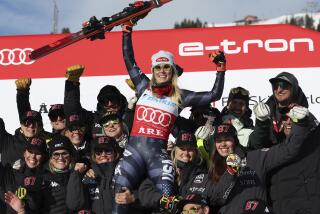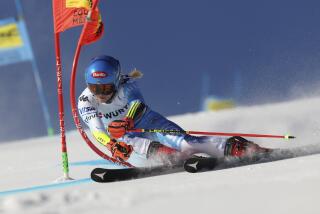World Cup Skiing : Italy’s Tomba Gets Third Straight Win
- Share via
Italy’s Alberto Tomba, boosted by cheers from a crowd of about 10,000, soared ahead in the Alpine World Ski Cup standings Sunday by winning a men’s giant slalom at La Villa, Italy, his third consecutive victory of the season.
Tomba, who will be 21 Saturday, beat runner-up Rudolf Nierlich of Austria by .76 of a second on a sunny but sub-freezing day. The Bologna native clocked an aggregate time of 2:32.34, winning the morning run on the 54-gate Gran Risa course and placing second to Austrian Hubert Strolz in the afternoon session.
“I feel the strongest,” Tomba said. “I just hope my form continues throughout the season. I’m looking for victory No. 4 now.”
His next race is a slalom Wednesday in Campiglio, Italy.
Tomba leads the overall standings with 75 after three victories in three starts. He won a slalom and giant slalom at Sestriere, Italy, last month in the season’s opening weekend.
Pirmin Zurbriggen of Switzerland, the double world champion and World Cup holder who was sixth Sunday, is second in the standings with 59 points.
Ida Ladstaetter of Austria finished third in each heat at Leukerbad, Switzerland, to gain the first World Cup victory of her career, winning the women’s slalom with an aggregate time of 1:34.63.
The 22-year-old edged Sweden’s Camilla Nilsson by .04 of a second. Blanca Fernandez-Ochoa of Spain, winner of the season’s first slalom at Sestriere, finished third.
Downhill specialist Tori Pillinger of Park City, Utah, was in stable condition after undergoing a 2 1/2-hour operation on her badly broken right leg, an injury she suffered in a terrifying spill Saturday at Leukerbad.
Dr. Grady Jeeter, the U.S. team surgeon who performed the operation, also said that Pillinger sustained severe ligament damage to the left knee, a broken pelvis and possible internal injuries. A second operation will be required for the damaged ligament.
Pillinger will be 21 Friday.
“To tell you the truth, we are very, very fortunate that she is alive,” said Chip Woods, the coach of the U.S. women’s World Cup team. “She hit a steel post in the finish area at probably 45 or 50 m.p.h. If she had hit it with her neck or upper back, she could have suffered severe spinal injuries.”

